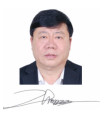
|
Professor Henry N.C. Wong obtained his B.Sc. degree with First Class Honours from The Chinese University of Hong Kong (CUHK) in 1973 and his Ph.D. degree from University College London (with Professor Franz Sondheimer) in 1976. After working at Harvard University as a Postdoctoral Associate with Professor Robert B. Woodward, he returned to University College London to begin his independent research undertaking as Ramsay Memorial Fellow. From 1980 to 1982, Professor Wong did research at Shanghai Institute of Organic Chemistry, The Chinese Academy of Sciences. In 1982, he went back to Hong Kong, and started his career at CUHK his alma mater. He retired in 2018, and is now Emeritus Professor of Chemistry and Research Professor.
Professor Wong's achievements in organic synthesis have been broad and profound, leading to a great number of impactful inventions of novel and powerful synthetic procedures applicable to the syntheses of biologically important natural products as well as non-natural molecules. Among others, his principal interests in the non-natural molecules have focused on the development of synthetic methods and strategies that achieved the syntheses of enediynes and planar dehydro[8]annulalenes, in which he made pioneering and strategically important contributions.
Throughout his carrier as a synthetic chemist, he has not only been an extraordinary research scientist, but also a great mentor for researchers. He has supervised and nurtured more than 100 graduate students and post-doctoral fellows in the last four decades, many of whom have ultimately grown to be professors and leaders in distinguished research institutes or major companies.
I joined Prof. Wong's laboratory at the Chinese Medicinal Materials Research Centre of CUHK in February 1989. My Ph.D. project was associated with a programme funded by the Hong Kong Jockey Club for the identification of potential cardiovascular compounds from Salvia miltiorrhiza Bunge (Danshen), a well-known traditional Chinese herb medicine. The aqueous extracts of Danshen are used widely in China to treat acute myocardiac infarction and angina pectoris. When I joined the team, a compound called XH-14 was isolated with a significant inhibition (IC50 = 17 nmol/L) of [3H]-phenylisopropyladenosine binding to the adenosine receptor on bovine cerebral cortex membranes monitored by the adenosine radioligand binding assay. However, the structure elucidation of this compound was tedious, despite three generations of structures had been proposed. With three-year painstaking efforts, the structure of this active compound was finally established through a total synthesis as 5-(3-hydroxypropyl)-7-methoxy-2-(3-methoxy-4- hydroxyphenyl)benzo[b]furan-3-carbaldehyde. Needless to say, the research process was very challenging, yet going through the journey was indeed a terrific experience. In the course of the synthetic exploration, Professor Wong offered me a great opportunity of trying various organic reactions, for which I had never imaged before. Most importantly, through these exercises and with Professor Wong's great guidance and encouragement, I found myself increasingly attracted by the beauty of total synthesis for the art and science involved.
Professor Wong is truly a pioneer in the area of researching biologically active natural products from tradition Chinese medicines (TCMs). Dated back to early 1990's, Professor Wong together with other faculties members of CUHK started to build up the "Chinese Medicinal Materials Research Centre" at the University. At that time as a great experiment, the Center already accommodated chemists and biologists to work together under one roof towards the acceleration of drug discovery. In that course of work, I became tempted by the charm of TCM's ability to treat various complicated or even life-threatening diseases, which further inspired me to devote my career to the relevant research. I have always been very grateful to Professor Wong, who introduced me to this amazing scientific wonderland.
Attributable to his outstanding research accomplishments, Professor Wong has received many distinguished awards and high honours over the years. He won the 2nd Class State Natural Science Award of China in 1997. He was a Croucher Senior Research Fellow in 1999-2000, and was elected toThe Chinese Academy of Sciences, The World Academy of Sciences for the Advancement of Science in Developing Countries (TWAS) (formerly known as the Third World Academy of Sciences), as well as The Hong Kong Academy of Sciences in 1999, 2004 and 2015, respectively. With respect to administrative leadership contributions, Professor Wong is now the Head of New Asia College of CUHK. At the university level, Professor Wong was the Pro-Vice-Chancellor/Vice-President for Research from 2009 to 2013, as well as Dean of Science in 2012- 2018. He also serves on the editorial boards of several national and international journals.
I really appreciate that Prof. Xuechen Li gave me this great opportunity to write this special Feature Editorial, celebrating this special issue dedicated to Prof. Henry N. C. Wong, who was my great mentor including but not limited to his supervision of my Ph. D. programme at CUHK. I believe that most of Professor Wong's former students and postdoctoral associates would be delighted to know the special issue of Chinese Chemical Letters dedicated to Professor Henry N.C. Wong. Finally, I sincerely hope that Professor Wong will continue his works in both basic research and in identification and total synthesis of biologically important natural products for drug discovery.

|
Zhen Yang School of Chemical Biology & Biotechnology, Peking University, Shenzhen 518055, China E-mail address: zyang@pku.edu.cn (Z. Yang) |

|
Xuechen Li Department of Chemistry, State Key Laboratory of Synthetic Chemistry, The University of Hong Kong, Hong Kong, China E-mail address: xuechenl@hku.hk (X. Li) |
 2019, Vol. 30
2019, Vol. 30 
